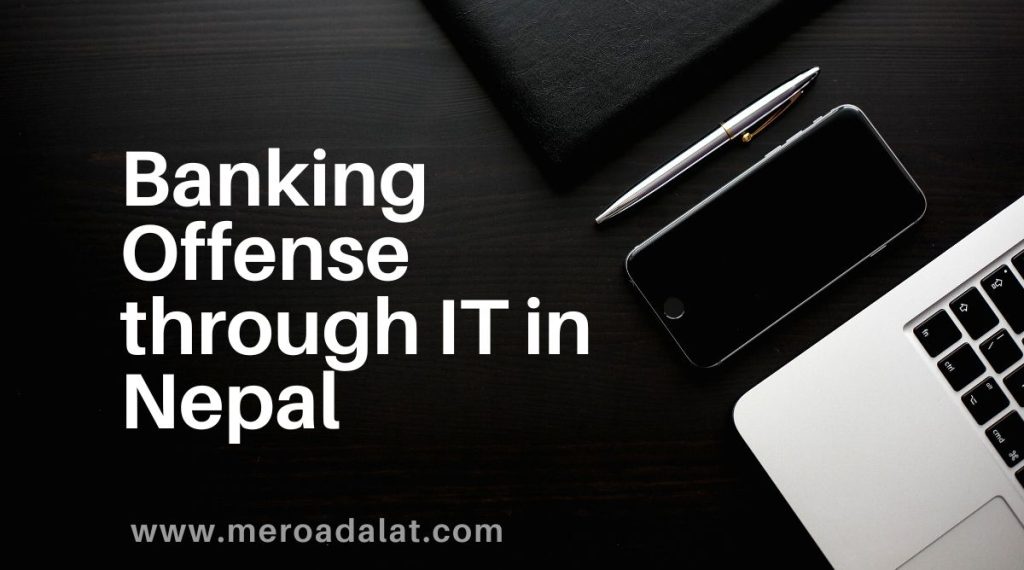This article is all about legal provisions relating to the banking offense through IT in Nepal.
“Banking” simply means accepting deposits of money from the general public for the goal of lending or investing, paid back on demand or otherwise, and mechanism for providing by cheque, draft, order, or even other means. Banks are among the financial system’s earliest financial intermediaries.
Banks and financial institutions play critical roles in the financial and economic systems of any nation. A very well banking system is a necessary prerequisite for flourishing international commerce, which enables connections with various countries. Any advanced economy’s support system is the banking sector.
It is one of the most essential principles of the financial system, and it plays a major part in an economy’s achievement or failure. Just a few years ago, the government implemented a policy of “one citizen: one bank account” to carry people in rural areas into the banking system and encourage the growth of financial institutions in remote regions.
However, as the number of banking service recipients increases, so does the likelihood of a banking offense occurring.

Essentially, a banking offense is any conduct in which the state’s banking laws levy criminal penalties in order to safeguard monetary sustainability and discipline. The nation enforces criminal sanctions for actions such as cheque forgery and misuse of bank debt or other services.
In Nepal, these are among the most common banking offenses. The Nepalese government enacted the Banking Offence and Punishment Act in 2008 to mitigate the effects and risks that come with financial institutions and banks that may be resulted from potential offenses in banks and other financial institutions. Similarly, the act was put in place to increase public confidence in the banking structure.
There are various types of banking offenses. As enlisted by Banking Offence and Punishment Act some of them include: Opening an account or demanding cash payment in an unauthorized manner, making unauthorized withdrawals or payments, obtaining or making payment by way of abuse or unauthorized use of electronic means, making available or providing loans in an unauthorized manner, misusing credit facility, misusing banking resources, means and assets acquiring assets or opening account by the borrower having dues and so on.
The 21st century has seen the rise of some ground-breaking information technologies which have transformed our way of living. The notion of science and technological progression is not simply a portion of the present era; it serves as the fundamental basis of the innovative world of today and that we hope to create tomorrow.
Technological and scientific progression is the big aspect for advancement in disciplines like economic systems, health, education, communication, entertainment, as well as every field we can probably imagine of. So, it can be summed up that banking offenses are committed by the use of computers, computing networks, or any other electronic form.
Most essential functions of 21st-century civilization are intrinsically tied to digitalization, particularly the finance system, whose business model is based on consumer trust in the system as a whole.
The Internet has become the primary means of transferring funds among banks and other financial institutions; most customers use banking online to maintain their accounts and perform the majority of point-of-sale payment transactions. The more dependent the financial sector becomes on digital technology, the further intertwined it becomes and the more vulnerable it grows to technological oppression or exploitation.
Customers are largely responsible for favoring comfort over safety, and banking institutions convince users to use online technology to boost efficiencies and reduce their operating costs. The financial sector undergoes bigger losses from cyberattacks compared to any other field, apparently experiencing threats three times as often as other industries.
According to a recent International Monetary Fund (IMF) report, banks’ estimated yearly potential losses from cyberattacks could amount to 9% of their net revenue. In today’s globalized economy, the banking industry provides numerous services to its customers and users, including online banking and payment services.
Payment by debit card online Customers can use the internet and cell phones to reach all different kinds of bank facilities and they can handily transact and manage their account balances from any part of the globe. These facilities, we all recognize, are advantageous to customers, however, they also get a dark side, which involves hackers and robberies.
Also Read: Law Related to Social Media
Legal provisions relating to the Banking Offense through IT in Nepal
Banking Offence in Nepal is regulated by Banking Offence and Punishment Act, 2064, and somehow by Asset Laundering Prevention Act, 2064 B.S., and Bank and Financial Institution Act, 2073 B.S. which is applicable both within Nepal and to individuals and institutions living overseas after having committed a banking offense in Nepal.
Section 6 of the Banking Offence and Punishment Act
No person should obtain or make payment by the way of abuse or unauthorized use of a credit card, debit card, or any other electronic means.
Likewise, in the Bank and Financial Institution Act, of 2073 the term ‘electronic transaction’ has been defined as the business of accepting deposits, making a payment, and transferring money via telephone, telex, computers, magnetic tapes, or other similar electronic equipment, as well as transactions carried out via terminals, automated teller machines, and cash dispensing machines, as well as those carried out via charge cards, debit cards, or credit cards.
Conclusion
A strong banking system is required for flourishing international trade and financial augmentation, which is increasing as a result of the flexural character of globalization and economic interconnectivity.
A national banking system connects the country to global trade. Henceforth, it can be concluded that the paradigm of banking offenses has shifted significantly since earlier days.
The majority of banking offenses are committed by gaining illegal or unauthorized access to bank information and then misconstruing that relevant data to transfer millions of rupees from one account to the other in a short amount of time. As a result, as technology advances, new types of banking crimes emerge.
Thus the regulation of banking offenses through IT in Nepal is the prime necessity today.
